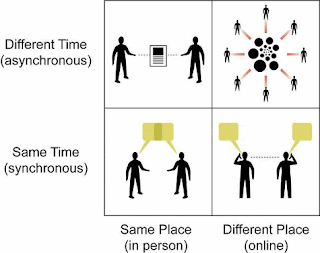Synchronous and Asynchronous communication is a separate term which are both different. Synchronous communication is direct communication between learner and student. For example is during the class period. When both of them is separated by distance, the process of training can still work on by using video conferencing, audio conferencing, text conferencing and visual image. If the trainer want to recognize the progress the learner, online testing will be the method for analysis.
Asynchronous communication is indirect communication whereas the trainers and learners are separated by distance and time. The training materials and lessons are implemented by using printed documents, training manuals, announcement and online guidance. Particularly, the communication is still maintained with the existence of thread discussion, email, chat rooms and group collaboration. Usually, the progress tracking is accomplished by online testing and the record on the task submitted.
Scenario
Synchronous:
The absent student will come and see the lecturer to ask for the task given for him. However, if the lecturer is not in his room, the student can still text him by mobile phone.
Asynchronous:
Someone that want to get the guidance from specific people can send an email. The email then will be replied whether straight forward or need to wait in several time.
In your opinion, which is better communication. Synchronous or asynchronous?
For other information, you may refer to:
http://www.linktionary.com/s/sync_comm.html
http://www.inetdaemon.com/tutorials/basic_concepts/communication/asynchronous_vs_synchronous.shtml
For other information, you may refer to:
http://www.linktionary.com/s/sync_comm.html
http://www.inetdaemon.com/tutorials/basic_concepts/communication/asynchronous_vs_synchronous.shtml



